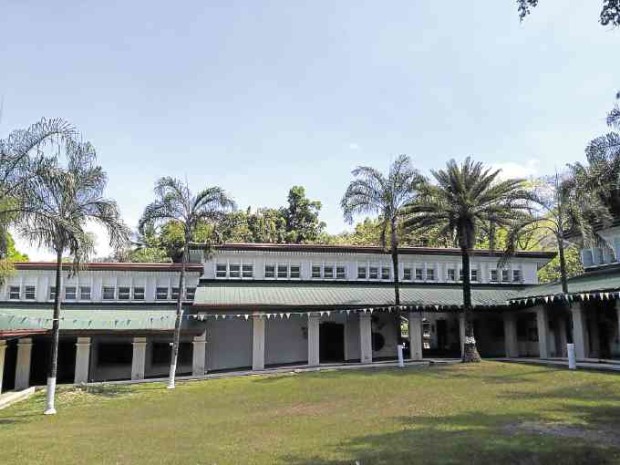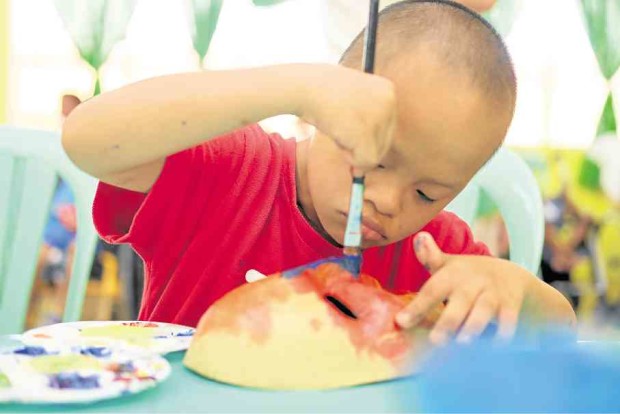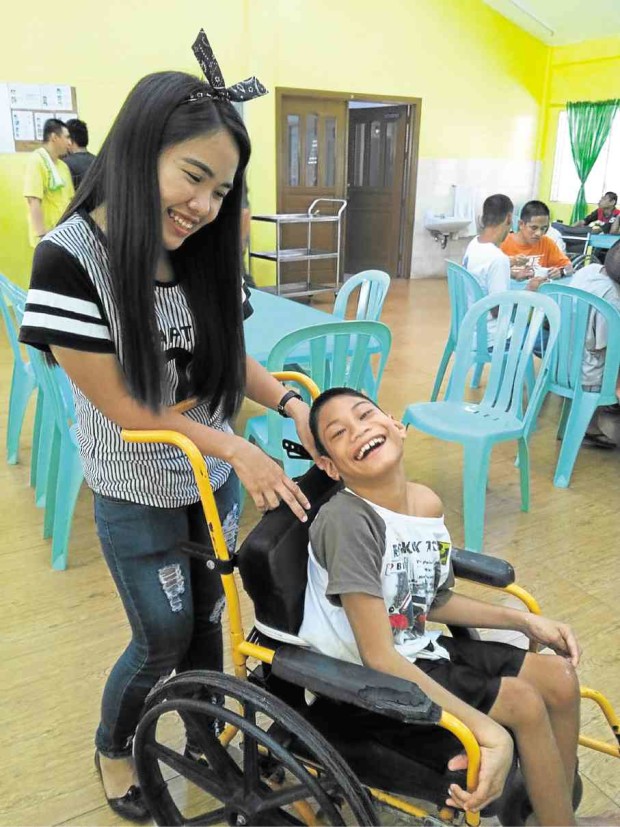Where abandoned PWDs finally feel loved

Built in 2000, the Cottolengo Filipino compound in Rodriguez, Rizal, is currently home to 39 young persons with disabilities. Run by a religious congregation with roots in Italy, the shelter promotes a family-type environment for its wards through a combination of health services, educational activities and values formation. It welcomes donors under a program called “distanced adoption.” —Photos by Matthew Reysio-Cruz and Krixia Subingsubing
Tucked in a craggy mountainside in Rodriguez, Rizal, the tree-covered compound rocked with the dance hits of Bruno Mars—and it was just 10 in the morning. Amid the booming music, shrieks and laughter added to the cheerful din.
A party (with a magic show and an art activity thrown in) was in full swing, the revellers frolicking and swaying to the tune—many of them in wheelchairs, some with autism, others with Down syndrome or cerebral palsy.
They are the boys of Cottolengo Filipino (CF), a private, nonprofit shelter for young persons with disabilities (PWDs). At present, 39 wards call it their home, whose Italian name means asylum for the mentally and physically handicapped.
CF was built in 2000 in a sprawling, two-hectare estate in Barangay San Rafael, as part of a worldwide network of shelters run by Little Work of Divine Providence, a congregation founded by Saint Luigi Orione. The Rizal-based cottolengo is considered the only one of its kind in the country, where about 1.44 million people have disabilities, according to the Philippine Statistics Authority.
With well-ventilated hallways and colorful walls, the shelter could double as a gradeschool campus but with the peace and isolation of a religious retreat center. It has been a haven for PWDs who were abandoned as infants or toddlers by their parents, usually in dire need of medical attention when saved by social workers and placed in CF’s care.
Article continues after this advertisementThis is where, under the care of devoted staff members and volunteers, they finally begin to feel loved, receive proper nourishment, and attain a measure of literacy, self-reliance and even empowerment as they grow up.
Article continues after this advertisementCF’s mission makes it “more than a hospital with walls,” according to Cottolengo Filipino chair and president, Fr. Stefan Bulai from Romania.
Eleven of the current wards have autism and cerebral palsy, while six boys have intellectual disabilities and five have Down syndrome. Eight of them have multiple disabilities, like a boy who has both cerebral palsy and microcephaly, or another who is blind and has a developmental disability. Two boys with autism are also deaf and mute.
Language of touch
Yet a typical day in Cottolengo is filled with constant movement, thanks to their joy, warmth and boundless energy, often channeled through activities like painting, dancing and a yearly trip to the beach. Most of the boys have limited vocabularies, preferring instead to communicate by touch—a tug on the arm, a playful shove, a hug.
When CF board member Mercedes Guerrero first arrived at CF 11 years ago, “it was love at first sight.”
“They have become like my children,” said Guerrero, who had watched the boys grow into young men. “It’s not just working as a volunteer or trying to find donors, you care for them like they’re your own family.”
As a surrogate parent, Guerrero also had her share of the tough realities that come with looking after sickly children. She could still vividly remember seeing one of the boys pass away in the hospital, attending to the postmortem paperwork and taking the body out of the morgue.
Seven wards have died since the shelter was established, all buried at the Most Holy Rosary Parish also in Rodriguez.
Ideally, the boys should be given care and their abilities developed until they are fit enough for reintegration into mainstream society, as prescribed by Republic Act No. 7277, or the Magna Carta for PWDs.
But because of their condition, it’s difficult for them to be adopted, Bulais said.
Nevertheless, the shelter makes sure that the boys’ needs are met, from food to schooling. Those in wheelchairs undergo physical and occupational therapy, while most of them attend special education programs where they’re taught how to read and write by volunteer teachers and physicians.
‘We find ways’
For wards who could not participate in or respond to such activities, “[we try] to find other ways to involve them in therapy. Washing up, cleaning … coloring books, [even peeling] potatoes,” Bulai said.
Some get to participate in Mass as acolytes or sakristan.
At least one ward has been able to attend a regular school outside CF. Renan, a shy 20-year-old with a learning disability and an impaired left eye, is currently in the eighth grade at nearby Infant Jesus Learning Academy.
But others need more care than others, like the bedridden Kenneth, who has cerebral palsy and scoliosis, and whose muscles have atrophied. The 22-year-old requires expensive medication and treatment to survive, Bulai noted.
In need of more funding, CF spends about P25,000 a month for each boy to cover food and medication. The budgeting looks simple enough until one considers their dietary requirements: 10 of the wards can’t eat solid food, while one needs a special food supplement called Nutren.
Caring for these boys can be a “constant challenge,” Bulai said. “They are in such a condition that one day or another they might leave us, [especially since] the conditions of others are quite severe.”
“But we work not just to [provide for their] basic needs. It’s a constant push. We need to harmonize the little bit of the capacity they have. So they can go beyond what they can do,” he added.
Distanced adoption
While CF can count on a short-list of committed institutions for funding, more donors are welcome under a program called “distanced adoption,” Guerrero said.
“If you care to be a part of that program, you can make a [monthly pledge of] P3,000 for a child or as much as you want. Or maybe even a smaller amount, since we pool our resources together,” she said. “It can go a long way.”
When the Inquirer saw the boys in the middle of a party last month, the scene was the opposite of what Krizel Manansala expected when she enlisted as a CF volunteer.
The 20-year-old Manansala said she expected a lot of screaming, struggling and cries of PWDs confined to their beds. But that morning, “they are inspiring, because even in their disabilities they soldier on. Whereas the rest of us make big issues out of small problems.”
Cottolengo, the volunteer said, “is all about love.”

